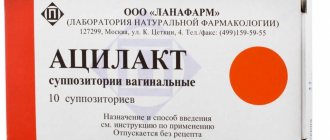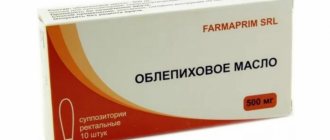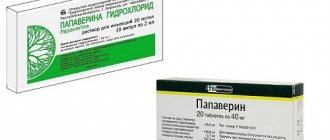Papaverine for hemorrhoids is used in the form of rectal suppositories. There are no direct indications for the treatment of hemorrhoids in the official instructions, but since it has an antispasmodic effect, Papaverine is prescribed for the prevention of hemorrhoids or in the early stages of hemorrhoidal disease.
At the same time, Papaverine suppositories normalize microcirculation in the anal area, improving the outflow of blood from the developing node. By relieving spasm of blood vessels, pain is relieved.
Pharmacological properties. Pharmacodynamics
Papaverine hydrochloride is a myotropic agent with an antispasmodic effect. It inhibits phosphodiesterase, causes the accumulation of cyclic 3,5-adenosine monophosphate (AMP) in the cell and reduces calcium levels. It relaxes the smooth muscles of internal organs (digestive tract, respiratory tract, genitourinary system) and blood vessels. In high doses, it reduces the excitability of the heart muscle and slows down intracardiac conduction. The effect of papaverine on the central nervous system is weak, but in large doses it has a sedative effect.
Hemorrhoids in women. Treatment of hemorrhoids in pregnant women
How to treat hemorrhoids after giving birth?
Very often during pregnancy an unpleasant problem arises - hemorrhoids.
This is due to the fact that the uterus, which has significantly increased in size (especially in the second half of pregnancy), begins to put pressure on the pelvic area. This pressure on the vessels does not go unpunished - blood circulation is disrupted and blood stagnation occurs. This is what leads to the fact that the cavernous bodies of the final section of the rectum increase in size and form hemorrhoids.
Additional factors influencing the development of the disease are a decrease in a woman’s physical activity and the appearance of constipation. The intestines are not stimulated enough, peristalsis stops working normally. All this leads to further development of the disease, which is aggravated by childbirth.
Hemorrhoids after childbirth
After childbirth, the disease begins to bother the woman even more. Even if during pregnancy she managed to cope with acute attacks with the help of preventive measures, postpartum hemorrhoids require more serious treatment methods.
What does hemorrhoids look like in women after giving birth? During childbirth, there is a strong increase in intra-abdominal pressure, due to which increased blood flow begins to the blood vessels of the rectum. Hemorrhoids swell and come out. This becomes the reason that a woman recovering from childbirth is forced to deal with this problem as well.
During this period, a woman is most vulnerable and a special approach to therapy is required. If you do not start the disease, manage it correctly and do not self-medicate, the disease will go away forever.
Postpartum hemorrhoids often occur in an acute form - pain in the anus, difficulty in bowel movements, bleeding. You cannot ignore these symptoms - you should definitely consult a doctor who will tell you what to do.
Treatment of hemorrhoids after the birth of a child usually involves the use of conservative therapy. Special recommendations are aimed at helping a woman quickly recover and cope with the disease.
Hemorrhoids during lactation
During lactation it is not recommended to use surgical methods to treat the disease. Only conservative methods, soft preparations created specifically for women in labor and preventive measures.
As a rule, women are prescribed special suppositories and ointments that have anti-inflammatory and analgesic properties that soothe the itching and burning sensation of the bath. Despite the apparent ease of treatment, all these procedures should be prescribed only by a proctologist. Based on the woman’s condition and taking into account her situation, he will prescribe the necessary medications that will not harm either the mother or the baby.
To prevent constipation, which contributes to acute attacks, it is necessary to choose a balanced diet. It should contain coarse fiber, which will prevent constipation and stabilize stool. Increasing physical activity, special exercises to strengthen the pelvic muscles - all these methods will serve as the basis for stabilizing the condition.
Contraindications
Papaverine suppositories should not be used in the following cases:
- Glaucoma.
- Severe dysfunction of the liver and kidneys.
- Allergy to the components of the drug.
- Thyroid diseases.
- Traumatic brain injuries.
- State of shock.
- Impaired conduction of heart rhythm.
Before using Papaverine, you should familiarize yourself with the contraindications
In addition, suppositories are contraindicated in patients under 6 months of age.
During treatment, it is prohibited to drink alcohol and smoke. Otherwise, the likelihood of a strong drop in blood pressure and loss of consciousness increases. Smoking reduces the pain-relieving effect of suppositories.
If there are contraindications or if the dosage is increased independently, adverse reactions may occur:
- nausea;
- lethargy, increased fatigue;
- constipation due to decreased intestinal motility;
- hypotension.
An overdose can lead to atrioventricular block or heart rhythm disturbances.
After childbirth
After conception, women experience complex hormonal changes in the body, which is why the use of various medications is strictly prohibited. But after childbirth, treating specialists can prescribe weakly concentrated medications for targeted effects.
For hemorrhoids in the postpartum period, papaverine can be prescribed, the active elements of which do not affect feeding and do not affect the health of the mother and baby. Suppositories are used to reduce postpartum spasms of the smooth muscle muscles of the abdomen, as well as eliminate persistent nagging pain in the groin area.
This medicine affects the body as follows:
- Almost instantly normalizes blood pressure.
- Improves blood supply to the uterus in the postpartum period.
- Helps relax the muscles that were involved during childbirth.
The drug is an excellent solution to any pain problems with muscles that were involved during childbirth. There is a decrease in spasm of the smooth muscle muscles of the abdomen, their tone improves and blood circulation is normalized.
Complications and prognosis
With timely diagnosis and high-quality treatment, retrochorial hematoma in most cases does not pose a further threat to the course of pregnancy, which ends safely through the natural birth canal, especially if the hematoma occurs in the early stages of pregnancy. But unfortunately, partial chorion detachment can also cause the formation of early placental insufficiency, premature aging of the placenta and fetal malnutrition. The risk increases with bleeding occurring at 7–12 weeks of pregnancy; in this situation, pregnancy may cease to develop in 5–10% of cases. Retroplacental hematoma that occurs in later stages of pregnancy, especially located below the umbilical cord insertion site, is accompanied by the risk of spontaneous miscarriages, premature abruption of a normally located placenta, premature birth, retarded fetal growth and development, and the development of feto-placental insufficiency.
Another important prognostic sign is the size of the hematoma - the prognosis is considered unfavorable if the volume of the hematoma is more than 60 cm³ or if the area of the hematoma is 40% or more of the size of the fetal egg.
Conclusions:
- Retrochorial hematoma may be an asymptomatic, incidental finding on ultrasound.
- Spotting bloody discharge from the genital tract in the presence of a retrochorial hematoma is a favorable symptom of its emptying.
- Even in the absence of bloody discharge from the genital tract, in the presence of a retrochorial hematoma, complete physical rest and adequate complex therapy are necessary (the most effective is in a hospital setting).
- A hematoma that occurs in the early stages of pregnancy, with timely treatment in most cases goes away without consequences.
- The prognosis for the further course of pregnancy after the formation of a retrochorial hematoma depends on the period of pregnancy at which it appeared, its location, and its size.
And most importantly, in the presence of such a complication, do not panic, but strictly follow all the recommendations of the attending physician. Then you will have every chance to safely and happily carry and give birth to a healthy baby on your own!
Use during pregnancy
The instructions for the medicine indicate that it should not be used during pregnancy, but experts often prescribe these suppositories to relieve various colics and spasms. Many doctors note the lack of a targeted effect on the mother’s body. You need to be wary of individual intolerance to individual components of this medicine.
This antispasmodic is characterized by greater popularity in comparison with more expensive analogues. It is important to limit taking the medicine together with other prescribed drugs; adverse reactions of the components can seriously harm the fetus.
Papaverine is often prescribed if increased uterine tone is diagnosed, pain discomfort occurs in the lower abdomen, or there is a risk of premature birth.
The use of papaverine-based suppositories is made when diagnosing the following conditions:
- As an adjuvant for lowering blood pressure.
- The uterus of a woman in labor is in a hypertensive state.
- Can be used to intentionally raise temperature.
- The condition of premature birth for a woman in labor brings a lot of negative emotions, fear and nervous tension. This component allows you to get rid of this condition.
- Eliminates renal colic.
- When diagnosing complications on the respiratory system, it acts as a means of improving the respiratory process.
- Helps optimize blood circulation in the brain.
The advantage of this product for pregnant women is considered to be a low concentration of active ingredients, as well as an immediate effect on the problem.
average price
Papaverine, sold in tablets, consists of papaverine hydrochloride, stearic acid, a small amount of sugar and potato starch. The number of tablets in a blister is 10. The average price of a blister is 35 -50 rubles.
A more effective form of release of this medicine is injection ampoules. Each ampoule is 2 ml. The manufacturer contains 10 ampoules in the package. The composition of the injection is slightly different from regular tablets.
The papaverine ampoule contains:
- hydrochloride;
- additional disodium edetate;
- there are inclusions of methionine;
- water for a more uniform injection.
The bioavailability of the main component of the drug is relatively high, which allows injections directly under the skin in focal areas, intramuscular administration is allowed, and intravenous injections are also carried out. The cost of papaverine in ampoules is set at 160 rubles.
The use of rectal suppositories
Suppositories with papaverine for hemorrhoids act directly on the hemorrhoidal veins and tissues of the anal canal. They eliminate acute pain, relax the muscles of the intestines and sphincter of the anus. Myotropic antispasmodic normalizes blood circulation in the rectal area and exhibits a pronounced analgesic effect.
Papaverine suppositories are inserted into the cleaned anus
The suppository contains a lower concentration of papaverine than tablets. Suppositories act locally; they quickly affect the inflammatory focus in the anal canal. In addition, rectal capsules are better tolerated by patients and rarely cause adverse reactions.
Before using suppositories, you must empty your bowels and wash your anus with cool water and antibacterial soap. Doctors recommend administering the capsule before going to bed. To do this, you need to lie on your side, bend your knees and insert the suppository into the anus with the pointed end forward to a depth of 3–4 cm.
The candle will melt under the influence of heat, so you need to lie down for a while. Otherwise, the liquid will leak out of the anus. The main component quickly penetrates the bloodstream and spreads throughout the tissues of the body. And its effect appears 15 minutes after administration. Papaverine eliminates spasm of smooth muscles of the intestines and perineum.
Rectal suppositories are recommended to be used 1 or 2 times a day until the manifestations of hemorrhoids disappear. The proctologist will help determine the duration of the course for each patient individually.
Reviews of papaverine
There are positive reviews on the Internet about the results of using suppositories with papaverine. There is an increased healing ability of suppositories with papaverine and the rate of relief of hemorrhoidal spasms after use.
Here are a few:
- I faced the problem of hemorrhoids. I found an article on the Internet about the use of folk remedies. I treated and treated, but there was no relief. I went to the pharmacy and bought suppositories with papaverine. They cost pennies, but the effect is amazing. And so quickly, I don’t believe myself. It’s a pity that there are contraindications for use by older people, I would advise my mother, otherwise she suffers.
- Nice candles. The relief is immediate. Thanks to those who advised.
- The doctor prescribed papaverine suppositories after surgery. Relieves intestinal spasms and is considered a safe drug. At first they gave injections, but the injections were painful. I read on the Internet about suppositories with papaverine. I asked the doctor for advice - he suggested putting a candle at night. Satisfied. Easy to install, it worked the first time. It is well tolerated and acts quickly. Relieves cramps within half an hour.
- The price of candles with papaverine is ridiculous - ten candles cost 31 rubles in our city. There are contraindications for use, but few. There were no side effects either. I accept it without fear. I recommend it, it is a proven, affordable, easily administered drug.
Thus, suppositories with papaverine relax the intestinal muscles, promote cleansing and are considered an effective remedy in the treatment of hemorrhoids.
Papaverine suppositories for pregnant women
Papaverine is used during pregnancy under the supervision of a doctor. This is explained by the fact that the drug has not been tested on this category of patients, and therefore its effect on the body of the expectant mother and child is unpredictable. According to doctors, when a pregnant woman uses a suppository, the likelihood of a cardiotoxic effect on the fetus increases.
Pregnant women use suppositories only after doctor's approval
Pregnant women respond positively to Papaverine suppositories, claiming that there are no side effects after their use. However, to avoid negative effects, the medication is allowed to be used only for medical reasons. The doctor will conduct an examination, then, taking into account the possible benefits and dangers for the mother and fetus, he will determine whether to prescribe the drug to this patient or not. Usually, to treat the expectant mother, minimal doses of medication are used to help cope with pain and spasms.











